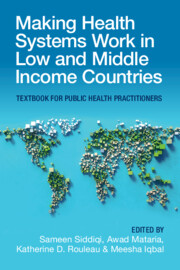 Making Health Systems Work in Low and Middle Income Countries
Making Health Systems Work in Low and Middle Income Countries Attributes and Approaches to Assessment
from Section 1 - Analyzing Health Systems: Concepts, Components, Performance
Published online by Cambridge University Press: 08 December 2022
Health system performance assessment (HSPA) is a promising tool to evaluate health system capacity in achieving health systems goals and informed policy for health systems strengthening. Despite its importance, no universal definition is available at global level to support HSPA implementation. This chapter highlights the evolution of HSPA frameworks, which mostly follow the scope and boundaries of health systems. Key characteristics of successful HSPA include regularity, transparency, comprehensiveness, being analytical and systematic, which result in valid assessment and inform policy. HSPA requires selection of indicators suitable to the country context; the criteria for selecting indicators include importance, relevance, feasibility, reliability and validity. Hospital performance assessment, a subset of the HSPA, is necessary as it consumes signification portion of health resources. HPSA also contributes to monitoring achievement of SDG targets 3.8.1 and 3.8.2 on Universal Health Coverage as committed by countries. The chapter concludes by providing evidence how Thailand's health system performed in response to COVID-19 pandemic.
To save this book to your Kindle, first ensure no-reply@cambridge.org is added to your Approved Personal Document E-mail List under your Personal Document Settings on the Manage Your Content and Devices page of your Amazon account. Then enter the ‘name’ part of your Kindle email address below. Find out more about saving to your Kindle.
Note you can select to save to either the @free.kindle.com or @kindle.com variations. ‘@free.kindle.com’ emails are free but can only be saved to your device when it is connected to wi-fi. ‘@kindle.com’ emails can be delivered even when you are not connected to wi-fi, but note that service fees apply.
Find out more about the Kindle Personal Document Service.
To save content items to your account, please confirm that you agree to abide by our usage policies. If this is the first time you use this feature, you will be asked to authorise Cambridge Core to connect with your account. Find out more about saving content to Dropbox.
To save content items to your account, please confirm that you agree to abide by our usage policies. If this is the first time you use this feature, you will be asked to authorise Cambridge Core to connect with your account. Find out more about saving content to Google Drive.